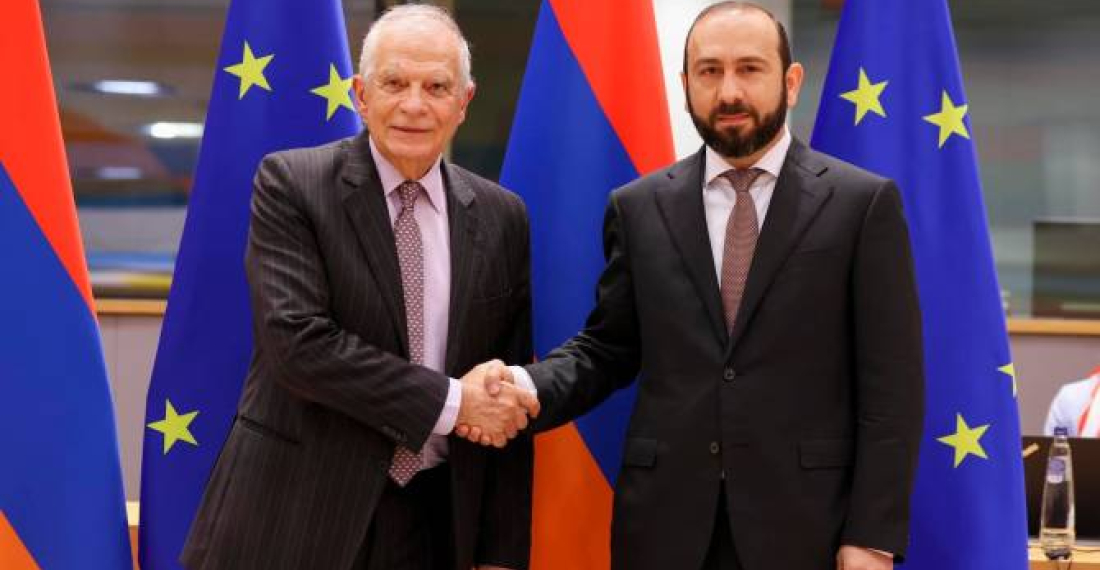The European Union and Armenia have launched work on a new "ambitious partnership agenda". This was announced by EU High Representative for Foreign and Security Policy, Josep Borrell at the end of a meeting of the EU Armenia Partnership Council. Foreign Minister Ararat Mirzoyan led the Armenian side during the discussions.
At the end of the meeting Borrell spoke to the media. Here is a transcript of his remarks:
Today, in our discussion, it has been clearly shown that our relations are developing on a positive track.
We had the opportunity to discuss the full spectrum of our relations, in the framework of the Comprehensive and Enhanced Partnership Agreement. But at the same time, we also acknowledged that there is room to unlock the full potential of this Agreement.
In October in the European Parliament, your Prime Minister [Nikol Pashinyan] said that Armenia is ready to move closer to the European Union.
In response, last October, the European Council, at the highest political level of the European Union, tasked me and the [European] Commission to explore ways to strengthen our relations - EU-Armenia relations - “in all their dimensions”.
In this context, today we decided to launch work on an ambitious new EU-Armenia Partnership Agenda.
This decision sends a strong signal of our mutual interest in a new strategic phase in our relations, and it will provide a clear roadmap and a vision for the way forward.
This is about the future. The future starts today.
But let’s look back at the last year. Human rights, the rule of law and democratic principles continued to underpin our cooperation. I welcomed the steps taken in the justice reform, the fight against corruption, and encouraged Armenia to further address challenges in the fight against discrimination, hate speech and disinformation.
I also want to congratulate – as I did - Armenia on becoming the 124th state party of the Rome Statute of the International Criminal Court. That is a very important and courageous decision from your side.
Looking ahead, we discussed options to start a Visa Liberalisation Dialogue with the European Union. I took good note of Armenia’s strong interest and encouraged Armenia to further step-up reforms in order to progress on this issue.
Together, we discussed how we can strengthen our relationship and in particular, the resilience of Armenia, notably in trade, on energy, on connectivity and aviation safety. We will also help decommission the Metsamor Nuclear Power Plant while improving nuclear safety.
I reaffirmed the European Union’s commitment to support Armenia’s participation in the Black Sea electricity cable project, and other regional connectivity projects. These initiatives have strong potential to serve [as] dividends for peace.
And, if you allow me, Minister, this brings me to another important point. We discussed the regional situation and the Armenia-Azerbaijan normalisation process, unhappily including the latest incidents at the border. The Armenian shooting of the Azerbaijani soldier yesterday was deplorable. But Azerbaijan’s response today seems to be disproportionate, ignoring the announcement by the Armenian Minister of Defence [Suren Papikyan] that this incident will be fully investigated.
This yet again illustrates the urgent need for the distancing of forces, which is something that the European Union has been advocating for a long time. Today, I have to reiterate the European Union’s full commitment to supporting a sustainable and lasting peace based on the principles of recognition of sovereignty, the inviolability of borders and territorial integrity.
Our mission in Armenia, the EU Mission in Armenia (EUMA) has recently been reinforced with a stronger, bigger number of staff, and will continue to contribute to ensuring an environment conducive to normalisation efforts.
We will continue supporting the Armenians displaced from the Nagorno-Karabakh region. Today, the Commission announced an additional €5.5 million in humanitarian aid. This funding comes in addition to €12.2 million already provided in September to address the urgent humanitarian needs, as well as €15 million budget support for the socio-economic needs of Armenia. We will continue to support Armenia, in the medium and long term, for the integration of refugees in your society and economy.
We discussed other areas to strengthen Armenia’s resilience, and I expressed my full commitment to further enhancing our cooperation in the area of security and defence. We will build our dialogue on foreign and security policy in the coming months.
Today’s meeting clearly showed that EU-Armenia relations are stronger than ever and that there is mutual interest to advance them further.
[We confirmed] our commitment to develop this agenda – an ambitious agenda for our renewed partnership. And when we will be advancing in this work and we are able to deliver some concrete results, it will be my pleasure to visit you in Armenia and to share with you your wonderful landscapes.






